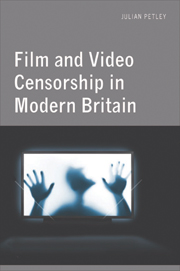Book contents
- Frontmatter
- Contents
- Acknowledgements
- Dedication
- Introduction
- Part I Censorious Rigmarole and Legalistic Overkill
- Part II After the Deluge
- Part III Nineties Nightmares
- Part IV New Millennium, New Beginning?
- 12 ‘The Way Things Are Now’: An Interview with Robin Duval
- 13 The Limits of the Possible
- 14 Full Circle
- Appendix: The DPP List of ‘Video Nasties’
- Bibliography
- Index
12 - ‘The Way Things Are Now’: An Interview with Robin Duval
from Part IV - New Millennium, New Beginning?
Published online by Cambridge University Press: 05 August 2013
- Frontmatter
- Contents
- Acknowledgements
- Dedication
- Introduction
- Part I Censorious Rigmarole and Legalistic Overkill
- Part II After the Deluge
- Part III Nineties Nightmares
- Part IV New Millennium, New Beginning?
- 12 ‘The Way Things Are Now’: An Interview with Robin Duval
- 13 The Limits of the Possible
- 14 Full Circle
- Appendix: The DPP List of ‘Video Nasties’
- Bibliography
- Index
Summary
JP: How do you take Christopher Tookey in the Daily Mail describing you as ‘less notorious but no less permissive’ than James Ferman?
RD: I don't particularly enjoy being referred to as notorious, and I don't particularly like being described as permissive, but I've no special objection to liberal, and I don't mind at all being characterised as a director of the BBFC who has moved things on into the twenty-first century. That inevitably involves a degree of liberalisation because that is the way the British community has moved.
JP: You've certainly introduced much greater openness and transparency into the Board's operations.
RD: One of the difficulties with the Board throughout a large part of its history was that, because it wasn't fashionable in those days to be reasonably up-front about decision-making criteria, it left an awfully large space available for newspapers and others who were hostile to the Board to fill in their own interpretations; naturally, in the absence of proper explanation of what the Board had been doing, those interpretations were factually all over the place. So, as far as I'm concerned, transparency is not simply a duty in the modern age which should be imposed on any regulator, it's also extremely advantageous in making sure that the starting point for any public argument is one that the regulator can actually recognise.
JP: You've also speeded up the classification process, which makes it much more difficult for the press to agitate whilst controversial movies await certification.
- Type
- Chapter
- Information
- Film and Video Censorship in Modern Britain , pp. 163 - 172Publisher: Edinburgh University PressPrint publication year: 2011

